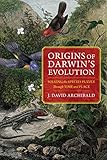Origins of Darwin's Evolution : Solving the Species Puzzle Through Time and Place / J. David Archibald.
Material type: TextPublisher: New York, NY : Columbia University Press, [2018]Copyright date: ©2017Description: 1 online resourceContent type:
TextPublisher: New York, NY : Columbia University Press, [2018]Copyright date: ©2017Description: 1 online resourceContent type: - 9780231176842
- 9780231545297
- QH365.O8 A73 2017
- online - DeGruyter
- Issued also in print.
| Item type | Current library | Call number | URL | Status | Notes | Barcode | |
|---|---|---|---|---|---|---|---|
 eBook
eBook
|
Biblioteca "Angelicum" Pont. Univ. S.Tommaso d'Aquino Nuvola online | online - DeGruyter (Browse shelf(Opens below)) | Online access | Not for loan (Accesso limitato) | Accesso per gli utenti autorizzati / Access for authorized users | (dgr)9780231545297 |
Frontmatter -- Contents -- PREFACE -- ACKNOWLEDGMENTS -- Chapter One. Establishing the Fact of Evolution -- Chapter Two. Darwin's Geological Education -- Chapter Three. The Gravest Objection -- Chapter Four. Marking Time -- Chapter Five. The Immutablists -- Chapter Six. Discovering the Long Dead -- Chapter Seven. Relating the Long Dead and Collecting the Recently Living -- Chapter Eight. Describing the Long Dead and the Recently Living -- Chapter Nine. Private Musings then Shared Sketches -- Chapter Ten. Darwin's Historical Biogeography -- Epilogue. What Many Reviewers Missed -- REFERENCES -- INDEX
restricted access online access with authorization star
http://purl.org/coar/access_right/c_16ec
Historical biogeography-the study of the history of species through both time and place-first convinced Charles Darwin of evolution. This field was so important to Darwin's initial theories and line of thinking that he said as much in the very first paragraph of On the Origin of Species (1859) and later in his autobiography. His methods included collecting mammalian fossils in South America clearly related to living forms, tracing the geographical distributions of living species across South America, and sampling peculiar fauna of the geologically young Galápagos Archipelago that showed evident affinities to South American forms. Over the years, Darwin collected other evidence in support of evolution, but his historical biogeographical arguments remained paramount, so much so that he devotes three full chapters to this topic in On the Origin of Species.Discussions of Darwin's landmark book too often give scant attention to this wealth of evidence, and we still do not fully appreciate its significance in Darwin's thinking. In Origins of Darwin's Evolution, J. David Archibald explores this lapse, showing how Darwin first came to the conclusion that, instead of various centers of creation, species had evolved in different regions throughout the world. He also shows that Darwin's other early passion-geology-proved a more elusive corroboration of evolution. On the Origin of Species has only one chapter dedicated to the rock and fossil record, as it then appeared too incomplete for Darwin's evidentiary standards. Carefully retracing Darwin's gathering of evidence and the evolution of his thinking, Origins of Darwin's Evolution achieves a new understanding of how Darwin crafted his transformative theory.
Issued also in print.
Mode of access: Internet via World Wide Web.
In English.
Description based on online resource; title from PDF title page (publisher's Web site, viewed 02. Mrz 2022)


